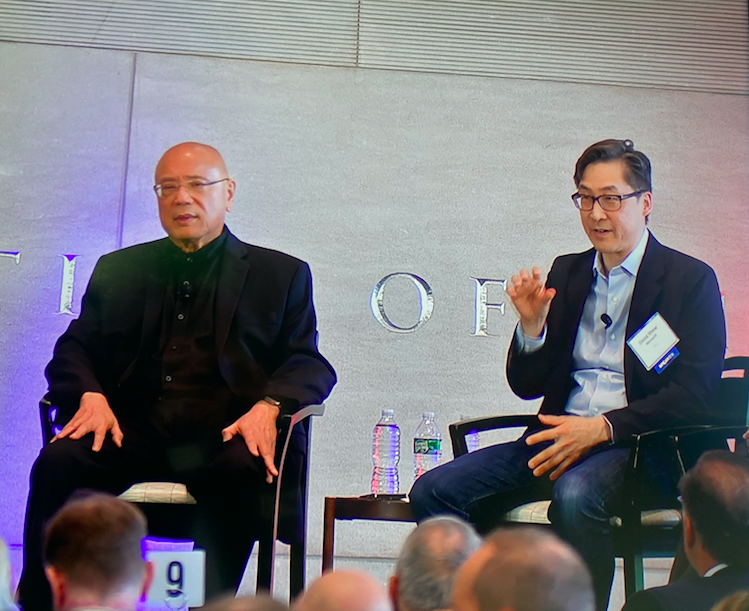A mix of extraordinary global and local leaders talked about the revolutionary impact of AI – and how businesses can harness it for good.
* * *
Few topics are as compelling for today’s CEOs as AI. How will the technology develop? How can companies embrace it to achieve greater success for all their stakeholders? And how can we ensure that AI will be a force for good?
The Satell Institute’s stimulating Spring 2024 Private CEO Conference — attended by a record-smashing crowd of more than 500 CEO members and guests at the National Constitution Center in Philadelphia and Heinz History Center in Pittsburgh — brilliantly addressed those important questions.
Exciting, thoughtful remarks from two of the world’s foremost experts on AI, as well as the contributions from local member speakers and the opportunity to have respected peer conversations, made the event a massive success. The conference re-enforced the vital role the Satell Institute plays as a CEO membership organization. Many attendees raved that the event — SI’s 13th private CEO conference — was the most helpful and meaningful yet, providing important information and fostering deep connections among influential leaders.
Ed Satell, SI’s founder and chair, began the morning with remarks that touched on the Satell Institute’s mission and growth. “We’ve exceeded our best expectations,” he said, noting that the Institute is on track to add more than 200 new CEO members this year supporting about 400 more nonprofits. He also laid out his bold vision for the future, one that ultimately includes SI chapters in the 50 biggest regions in the country. “Individually we can only do so much,” he said. “Together we can accomplish so much more. Think WE, not just me.”
Greg Hagin, CEO of CCS Fundraising and chair of the conference, introduced the morning’s important topic and connected it to SI’s focus on free enterprise and CSR.
“The American free enterprise system affords us limitless possibility,” he said, “and for those trying to advance Corporate Social Responsibility, those opportunities to do good may well involve — will involve — the future of artificial intelligence.”
Highlighting the morning were remarks from two global leaders deeply involved in the development and direction of AI: entrepreneur, investor and futurist Stephen Ibaraki (pictured, left), and clinician-leader David Rhew, M.D. (pictured, right), Chief Medical Officer of Microsoft Worldwide.
Here are four crucial takeaways from their remarks:
Do you have FUMO, FUD, or both?
That’s how Ibaraki began his remarks, asking audience members if, when it came to AI, they suffered from Fear of Missing Out (FUMO), or Fear, Uncertainty and Doubt (FUD)? Or, perhaps, both? When many arms shot up for the last answer, he laughed: “That’s almost the entire audience.”
Such reactions are understandable, Ibaraki said, given the size of what’s coming. “We’re going to see more innovation in the next few years than in the past 2 million years. What impact will that have?”
Ibaraki singled out AI’s influence on huge areas like global wealth and how it’s distributed, as well as climate change and whether the new technology will make the situation better or worse. And then there’s the impact on human beings themselves.
“How can we maintain critical thinking, empathy, individual accountability, and agency during this whole time of innovation of AI?” he asked.
AI will impact every industry.
That was one of the messages from Rhew, who offered his own field — healthcare — as an example.
Among the challenges facing healthcare right now, he noted, are high cost, access, and clinician burnout. AI already has the power to make an impact on those problems. By taking over administrative tasks, for example, AI can lower healthcare’s price tag. Thanks to the power of technology, treatments can be made more convenient for patients. And AI’s listening and note-taking capabilities can automatically enter information into a patient’s health record, freeing up doctors to focus more on their relationships with patients.
“Can we figure out ways to embrace AI and adopt it?” Rhew asked.
AI’s impact will only increase as it grows more powerful. “It’s going to be seamlessly integrated into everything you’re doing,” Ibaraki said. And it will take on both small tasks and massive ones. Ibaraki noted that technologists recently created the prototype for a new type of battery by using AI to analyze millions of materials. Without the power of AI and quantum computing, such an exercise would have taken decades; with AI, it took 80 hours.
“The changes that are coming are going to be so profound that you need to start looking at it in a focused way,” he said.
Start small — and focus on talent.
How can organizations get started using AI? Ibaraki noted there are many helpful resources available, from Mark Minevich’s book Our Planet Powered by AI to guidelines and protocols put together by organizations like Microsoft and the Institute of Electrical and Electronics Engineers (IEEE).
Rhew advised that one way to begin — and to ease employee anxiety about AI and job loss — is with brainstorming sessions focused on low-risk ways AI can be used in your business. He suggested coming up with four or five potential use cases, most likely in the operations and administrative side of your business; the more employees are involved in the creation and implementation of AI, the more comfortable they become with it. “These are tools for everyone to use,” he said.
Ultimately, companies need to focus on having the right kind of talent to embrace and implement AI. “Do you have the talent?” Ibaraki asked. “If you don’t, how can you acquire the talent, or how can you contract with the talent?”
Don’t turn off your brain.
Both Rhew and Ibaraki acknowledged that AI has potential downsides, from unintended consequences to bad actors deliberately using it for nefarious purposes.
The key is for humans to pay close attention to what’s happening. Rhew likened it to using GPS in your car. It’s a great technology — but every once in a while it can lead you in the wrong direction.
“We’ve got to keep our brains on,” he said, “and understand that oftentimes the AI has to be done with a human in the loop managing it.”
Despite the potential downsides, both global experts were clear on one thing: the revolution is happening. “Keep in mind we can’t stop it,” Ibaraki said. “It’s going to accelerate. How can we make sure we maintain its guardrails?”
In addition to Ibaraki and Rhew, the conference featured brilliant insights from SI members in each city who have deep knowledge of AI. In Pittsburgh Scott Angelo, CIO at Buchanan Ingersoll & Rooney, offered remarks, while in Philadelphia a panel featured Michael Pompey, Chief Information and Transformation Officer at the Girl Scouts Eastern PA; Felicite Moorman, Co-founder & CEO of BOSS.Tech; Anthony Mongeluzo, President and CEO of PCS, LLC; and Chris Fralic, Board Partner at venture firm First Round Capital.
In addition, Maura McCarthy, PhD, CEO of the Fairmount Park Conservancy, presented from the nonprofit perspective, emphasizing the importance of partnerships and collaboration. “As we move forward, technology and philanthropy will guide our success,” she said.
The conference concluded with SI’s hallmark Idea and Experience Exchange, with CEO members and guests engaging in deep discussions about AI with respected peers. Well over 200 takeaways from those discussions were captured — fittingly — by AI software Slido, then synthesized into 5 key points, showing the extraordinary power of AI.


